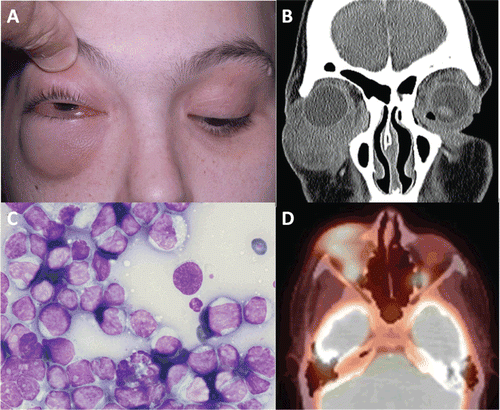
Overview
Orbital lymphoma is a type of non-Hodgkin lymphoma that arises in the tissues surrounding the eye, including the eyelids, lacrimal gland, and orbit. The most common subtype is extranodal marginal zone B-cell lymphoma (MALT type).
Symptoms
- Painless orbital mass or swelling
- Protrusion of the eye (proptosis)
- Vision changes or double vision
- Restricted eye movement
- Eyelid drooping or fullness
Causes & Risk Factors
- Chronic inflammation (e.g., autoimmune diseases or infections like Chlamydia psittaci)
- Older age
- Immunosuppression
- History of lymphoma or related blood cancers
Diagnosis
- Ophthalmic and physical exam
- Orbital imaging (CT, MRI)
- Biopsy with immunohistochemistry and flow cytometry
- Systemic workup: blood tests, bone marrow biopsy, PET/CT scan
Treatment Options
- Radiation therapy (mainstay for localized disease)
- Chemotherapy (e.g., rituximab-based regimens for systemic or advanced cases)
- Antibiotic therapy (e.g., doxycycline for C. psittaci-related cases in some regions)
- Immunotherapy and targeted agents in recurrent disease
Prognosis
- Generally favorable for localized MALT lymphoma
- 5-year survival often >90% in early-stage cases
- Risk of systemic progression in some cases; long-term monitoring is important
Living with this Cancer Type
- Regular ophthalmic and oncologic follow-up
- Visual rehabilitation if necessary
- Support for dry eye or cosmetic changes post-radiation
- Psychosocial care
Prevention & Screening
- No standard prevention
- Early evaluation of orbital or eyelid swelling
- Monitoring for recurrence in previously treated patients
FAQs
Q: Is orbital lymphoma curable?
A:Yes, especially if diagnosed early and treated with localized radiation.
Q: Will I lose vision or my eye?
A:Unlikely with timely treatment, but symptoms should be monitored.
Q: Is it related to systemic lymphoma?
A:It can be. Systemic evaluation is part of the diagnostic process.
Resources
- Lymphoma Research Foundation
- American Academy of Ophthalmology
- ClinicalTrials.gov
Understand Precision Testing
Learn how liquid biopsy and chemo sensitivity testing can personalize your treatment plan.
Make Informed Decisions
Gain knowledge to actively participate in treatment discussions with your healthcare team.
Improve Treatment Outcomes
Discover how precision medicine and metabolic therapies can enhance treatment effectiveness.
Start Your Educational Journey Today
Empower yourself with knowledge about precision metabolic oncology and take an active role in your cancer care journey.
Need More Information?
Our team of oncology experts is here to help you understand your diagnosis and treatment options.
